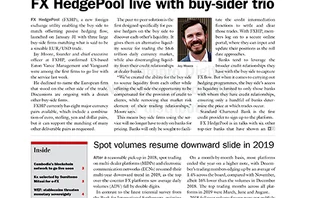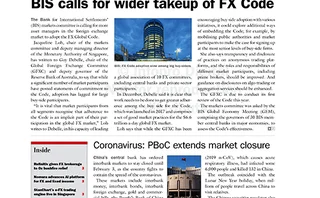
Spot FX faces clearing threat

The five-strong panel discussed the logistical issues of enforcing regulation in the over-the-counter derivatives market, raising concerns over how foreign exchange will be adequately cleared.
Mark Yallop, group chief operating officer at Icap, said shorter-maturity products, including spot FX, might be forcibly cleared along with longer-dated FX products. "Otherwise people will be left with an unhedged position between a cleared product on one side and an uncleared product on the other," he said.
John Wilson, managing director and global head of OTC clearing at Royal Bank of Scotland, agreed splitting up cleared and non-cleared products might leave banks with exposures too big to manage.
"If today Bank A and Bank B trade an interest rate swap and a swaption with each other, we would net those exposures off with each other. Going forward, one of those products will go to the clearing house (CCP) and one will be left behind."
Listeners contributed their opinions to the debate: 65% who voted in a live poll said FX should not be centrally cleared at all. Yallop agreed spot FX is effectively settled through CLS Bank but said long-dated FX forwards and options, which incur significant credit risk, are suitable for clearing.
The panellists raised a series of concerns with CCPs themselves, including competition between them for a slice of the potential profits. Wilson said: "We also do see some aspects of national championing going on around CCPs."
"It would be unfortunate if different jurisdictions decided to mandate clearing in their territory, by virtue of either the currency or a domicile."
It also appears the exemption afforded to corporate users of derivatives might not be as valuable as initially thought, according to Anthony Belchambers, chief executive of the Futures and Options Association. He pointed out that corporates might lean towards incentivised central clearing for derivatives if OTC derivatives are subject to punitive capital rules.
"Non-financial users might look at that [exemption] and think, ‘You know what, this is not worth very much’."
A consequence of this is that corporate users might abandon hedging altogether due to the prohibitive cost, according to Hubert de Lambilly, deputy global head of FX trading at BNP Paribas.
"Take a big corporate who has about $20 billion of hedging products – FX has moved about 15–20% this year, but posting $3 billion or $4 billion of collateral when you are an exporter is just impossible."
He said that in the past, some corporates reacted badly to stringent new accounting rules, abandoning hedging products altogether, and suffered losses.
It seems Europe might have the upper hand over the US in the OTC regulation debate. When asked whether institutions will move from the US to avoid certain provisions of the Dodd-Frank Wall Street Reform and Consumer Protection Act, 35% of the voting audience said yes.
Yallop pointed out that the US has a stricter regulatory stance than Europe, such as its ban on proprietary trading. "These differences are going to make a material difference in how banks organise themselves to trade, which will create regulatory arbitrage."
Belchambers added: "The US has made its law so its core negotiating position is 'do as we do'; the EU has not yet made its law so there's a bit more flexibility there."
To view the discussion please click here.
Only users who have a paid subscription or are part of a corporate subscription are able to print or copy content.
To access these options, along with all other subscription benefits, please contact customer services - www.fx-markets.com/static/contact-us, or view our subscription options here: https://subscriptions.fx-markets.com/subscribe
You are currently unable to print this content. Please contact customer services - www.fx-markets.com/static/contact-us to find out more.
You are currently unable to copy this content. Please contact info@fx-markets.com to find out more.
Copyright Infopro Digital Limited. All rights reserved.
You may share this content using our article tools. Printing this content is for the sole use of the Authorised User (named subscriber), as outlined in our terms and conditions - https://www.infopro-insight.com/terms-conditions/insight-subscriptions/
If you would like to purchase additional rights please email info@fx-markets.com
Copyright Infopro Digital Limited. All rights reserved.
You may share this content using our article tools. Copying this content is for the sole use of the Authorised User (named subscriber), as outlined in our terms and conditions - https://www.infopro-insight.com/terms-conditions/insight-subscriptions/
If you would like to purchase additional rights please email info@fx-markets.com
More on Foreign Exchange
Average reported daily UK FX turnover hits record high
Daily turnover of $2,881bn in October 2019, up 2% from previous high of $2,821bn in April
PBoC injects 1.2 trillion yuan as markets plunge
Chinese central bank eases to support economy as coronavirus spreads; Q1 GDP growth could drop to 4%
Spot volumes on platforms resumed downward trend in 2019
But an uptick was seen in FX swaps and forwards submitted for settlement
PBoC extends market closure as coronavirus spreads rapidly
Chinese central bank extends interbank markets closure and vows to maintain ample liquidity
Most read
- Are market-makers better at dealing with central bank intervention?
- Asia FX Awards 2024: The winners
- Banks face tough choices over single-dealer platforms







